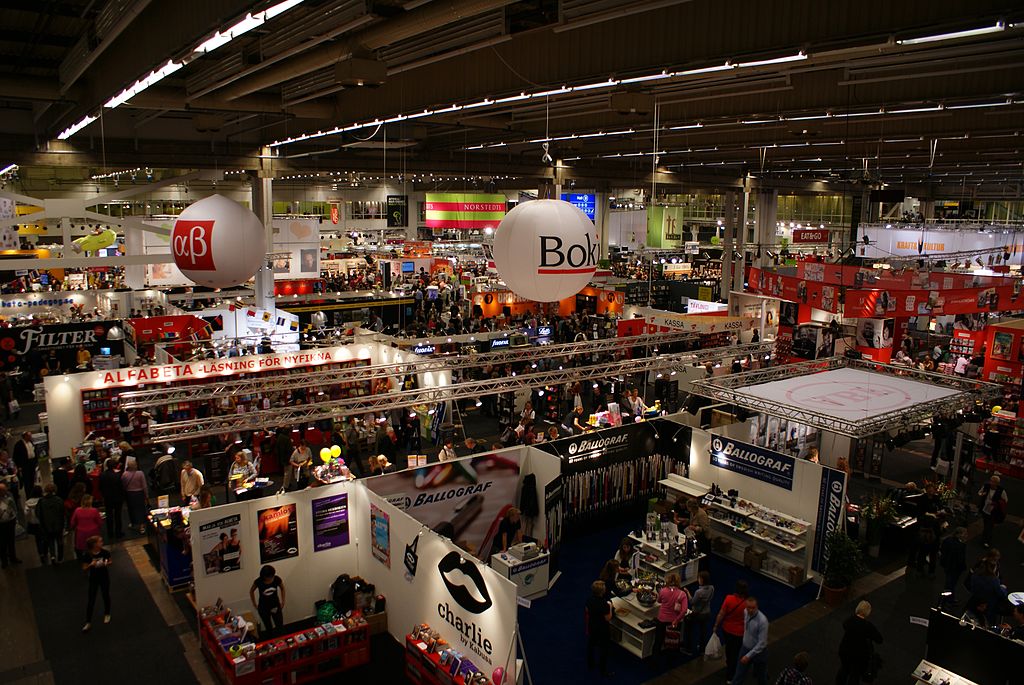The annual book fair in Gothenburg, Bokmässan, features an event focusing on international issues – “Internationella torget”. Utblick was there and talked to representatives of two organisations working with human rights issues; Operation 1325 and Emmaus. First out was Maj Britt Theorin – current President of Operation 1325 who has also served as a member of the Swedish as well as the European Parliament.
Operation 1325 is an umbrella organisation working for full international implementation of Resolution 1325, adopted by the United Nations’ Security Council in 2000. Resolution 1325 focuses on the necessity of involving both men and women in the work of conflict resolution and peace building.
Ms. Theorin explained that while women constitute half the global population, there is a stark absence of women within peace building efforts; both on national and international levels. Recognising that sustainable peaceful relations cannot be reached with only half the population on-board, especially in regard to the vulnerable position of women and girls in armed conflicts, Resolution 1325 aims to improve the participation of women on all levels of conflict resolution.
Despite the Resolution being adopted in 2000, full implementation remains elusive in most countries. Even in countries where the Resolution is formally implemented, such as Sweden, Ms. Theorin pointed out several weaknesses that hamper the usefulness of the Resolution. The Swedish implementation, for instance, is lacking on many fronts as it does not include any concrete objectives, time frames, or funding for the government agencies in question – thus carrying little actual force. (Report Monitoring Swedish implementation: http://operation1325.se/sites/default/files/women_count_2012.pdf
Operation 1325 uses a variety of methods to reach their goals; education, awareness campaigns and political influence. As an umbrella organisation bringing together women’s organisations worldwide, the Operation arranges lectures and seminars; both through its own initiative as well as local outreach programmes. According to Ms. Theorin, the most recent include seminars arranged in Sudan and a project with Libyan women’s organisations due to start shortly.
Due to their extensive experience within the Swedish and European Parliaments, Ms. Theorin and her fellow activists are also able to influence politicians in their natural mileu.
While the goal of ensuring gender equality in peace processes is still distant, there is some progress; Ms. Theorin mentioned the Nepalese implementation of the Resolution as a good example for other states to follow. “The Nepalese implementation is commendable as it provides ample opportunity for making a real difference, for example through providing various resources (monetary, judicial and medical) for women wounded in armed conflict.”
Next, Utblick met Julia Finér, president of Emmaus Stockholm, who was also present at Internationella Torget. Emmaus’ focus was to present their project for increased visibility of the Moroccan occupation of Western Sahara. Ms. Finér explained that while the occupation of Western Sahara has been ongoing since 1975, it receives very little international attention. Emmaus, is a solidarity-based group working for sustainability and justice, and seeks to highlight the problems in Western Sahara, by drawing attention to the situation.
Ms. Finér explained that the UN does very little to alleviate the situation. This limited role is attributed to France exercising its veto power within the Security Council in lieu of both its long term alliance with Morocco as well as its historical role as colonsier – hindering any intervention in the area. As a result, the UN force allowed in the area has no mandate to investigate human rights abuses. Effectively, human rights violations continue unhindered and the UN presence is useless for the Saharawi (Western Saharan) population. However, things are a-changing – in 2011 the EU voted against a treaty with Morocco on fish trade with occupied territories, for the first time opposing French opinion.
Emmaus works at improving awareness through several outlets; Swedish news outlets, parliament seminars, debate articles as well as active participation at events such as Bokmässan. They are also supporting the publication of a new book, “Tyst Territorium” – a compilation of reports from Western Sahara by noted investigative journalists Fredrik Laurin and Lars Schmidt. Furthermore, Emmaus is arranging a trip to Western Sahara, where participants will be guided around the area and visit refugee camps in Algeria. The aim is to give insights and increased visibility abroad, as traveling through Western Sahara privately, especially in more sensitive areas, is currently very difficult to do.
Text: Anja Johansson
Bild: Jan Ainali
Read more: Emmaus Stockholms Västsaharasida: http://www.emmausstockholm.se/vastsahara/
Western Sahara Resource Watch: http://www.wsrw.org/
Saharwian Fishermen Condemn EU-Morocco Fishing Treaty ‘Fraud’, EurActiv: http://www.euractiv.com/development-policy/saharawi-fishermen-condemn-eu-mo-news-530059





